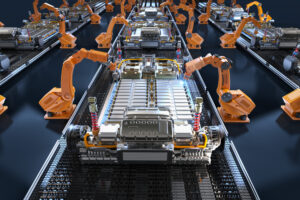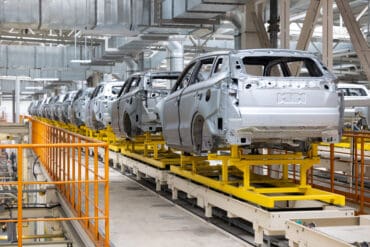
In an industry where development timelines are increasingly compressed, automakers face a critical choice: prioritize speed or maintain quality. The reality is that both are possible but only with the right tools and a well-prepared workforce.
The automotive industry is under immense pressure to innovate and bring new vehicles to market faster, faster, and faster. Compressed development and launch schedules are no longer the exception—they’re the norm. From new electric vehicle models to advanced driver assistance systems, automakers are racing (see what we did?) to stay ahead. But pulling it off requires more than just speed; it demands the right technology, processes, and skilled workforce to ensure quality doesn’t fall by the wayside.
Recent delays in EV production targets serve as a canary in the mine, so to speak, signaling what can go wrong when speed outpaces preparation. Succeeding in this high-pressure environment will require manufacturers to rely on cutting-edge technologies like AI-driven analytics, automated quality assurance, and agile development strategies, and they have to empower their teams to adapt and respond quickly.
It’s not just about going faster. It’s about doing it without compromise.
EV production delays
EV production delays have emerged as a visible example of the challenges compressed timelines can create. Several major automakers have been forced to delay ambitious EV goals for a variety of reasons, ranging from supply chain disruptions and technology integration issues to concerns over product safety.
Automakers haven’t abandoned these plans, just delayed them. And it’s looking more and more like this was a good move. Questions about whether certain automakers are in a position to be competitive at all compared to automakers in China have made it more appealing to delay.
The broader industry impact
The problem isn’t unique to EVs. Across the automotive sector, the pressure to accelerate timelines can lead to significant risks. Automakers that fail to balance speed with quality face the likelihood of increased recalls, product malfunctions, and operational inefficiencies. Cutting corners in the name of speed isn’t just a short-term fix; it can become a long-term liability.
Cox Automotive predicted “normalcy” this past year with some slowing in growth and demand. Automakers are now faced with an obstacle and a challenge in one: how do they keep the pace of innovation and pressure to compress launches while acknowledging the current climate?
Leveraging advanced testing technologies
To maintain high standards of quality while meeting compressed development timelines, automakers are increasingly turning to advanced testing technologies. These tools allow manufacturers to accelerate the testing process but keep high levels of precision, ensuring that vehicles meet stringent safety and performance standards before they reach the market.
Simulation and virtual testing
One of the most impactful innovations in automotive testing is the use of digital twins and virtual simulations. These technologies create detailed virtual models of vehicles, enabling automakers to run extensive tests on every aspect of design and performance long before the first physical prototype is built. From crash simulations to battery performance tests, virtual environments provide rapid feedback so manufacturers can iterate quickly and avoid costly delays associated with physical testing.
For example, with the complex battery systems in electric vehicles, virtual testing allows automakers to simulate extreme conditions, such as temperature fluctuations and long-distance driving, without requiring multiple physical prototypes. This approach can catch issues early.
AI-driven analytics
Artificial intelligence and machine learning are having massive effects on automotive development. By analyzing massive datasets from past vehicle performance and real-time production data, AI-driven testing can predict failure points, optimize component designs, and suggest adjustments before problems emerge. These predictive capabilities enable automakers to spot potential issues long before they cause delays or require expensive rework, effectively compressing the testing phase without reducing its thoroughness.
AI also plays a critical role in automating quality checks during production. With sensors and machine learning algorithms, manufacturers can identify anomalies or defects in real time, ensuring that quality is maintained even as production speeds up.
Automation and robotics in quality assurance
In compressed development timelines, automating quality assurance processes is essential to maintaining precision and consistency. Automakers are increasingly turning to robotics and real-time data to ensure that production speed doesn’t lead to compromised quality.
- Automated Inspection Systems: Robotic inspection systems equipped with sensors and cameras detect micro-defects in real-time, ensuring materials and components meet quality standards without slowing production.
- Data-Driven Continuous Improvement: Automated systems collect and analyze data throughout production, identifying inefficiencies or defects and triggering immediate corrective actions. This supports continuous improvement without delaying the process.
- Scaling Precision: Automation allows manufacturers to maintain consistent quality. Robots perform precise inspections 24/7, eliminating the risk of human error and ensuring that every vehicle meets strict standards—even under tight timelines.
Agile development for quality in rapid cycles
Automakers are also adopting agile development practices, originally pioneered in software, to streamline production and allow for continuous feedback. This process helps ensure that manufacturers don’t have to cut corners even though production cycles are shortening.
- Flexible manufacturing systems: By incorporating modular designs and flexible assembly lines, manufacturers can quickly pivot when changes are needed, such as responding to quality concerns without causing delays.
- Cross-Disciplinary collaboration: Close collaboration between relevant team members is critical in compressed timelines. Engineers, designers, and quality assurance teams work together from the start to ensure that any potential issues are addressed early in the process. This alignment helps prevent bottlenecks and reduces the likelihood of last-minute fixes that could delay launches.
- Iterative testing and feedback: An iterative approach allows teams to test and refine components or systems in rapid cycles. Automakers can then identify issues early, adjust designs as needed, and maintain quality throughout the development process, all while keeping the project on schedule.
See also: EV Manufacturers Double Up on Digital Twins
Empowering the workforce in compressed timelines
While advanced technology and agile processes are essential for managing compressed timelines, none of it works without a skilled, adaptable workforce. Automakers are increasingly investing in upskilling their teams to work with EVs and cutting-edge tools like AI-driven analytics, robotics, and digital simulations. This means engineers, designers, and quality control teams need to be equipped not only with technical knowledge but also with the ability to collaborate seamlessly across departments.
Agile manufacturing also requires a shift in how teams work. Cross-functional collaboration ensures that any potential quality issues are addressed early in the development process. By empowering their workforce with the right training and fostering a culture of flexibility, automakers can better respond to the demands of rapid development cycles without sacrificing the quality consumers expect.
See also: Addressing a Fact of Life: Compressed Development and Launch Times in Auto Manufacturing
What to do about compressed timelines
So what’s the takeaway? In an industry where development timelines are increasingly compressed, automakers face a critical choice: prioritize speed or maintain quality. The reality is that both are possible but only with the right tools and a well-prepared workforce.
The solution lies in embracing advanced technologies like AI-driven analytics, digital twins, and automated quality assurance paired with agile manufacturing practices. These tools enable automakers to meet compressed timelines and do so without cutting corners. In this fast-paced industry, this tech will give auto manufacturers the chance to get somewhere more quickly while also delivering quality products for consumers.








